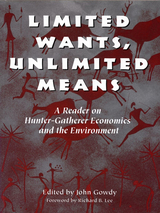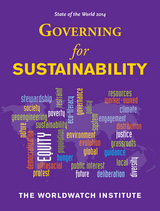
For roughly 99% of their existence on earth, Homo sapiens lived in small bands of semi-nomadic hunter-gatherers, finding everything they needed to survive and thrive in the biological richness that surrounded them. Most if not all of the problems that threaten our own technologically advanced society -- from depletion of natural capital to the ever-present possibility of global annihilation -- would be inconceivable to these traditional, immediate-return societies. In fact, hunter-gatherer societies appear to have solved problems of production, distribution, and social and environmental sustainability that our own culture seems incapable of addressing.
Limited Wants, Unlimited Means examines the hunter-gatherer society and lifestyle from a variety of perspectives. It provides a brief introduction to the rich anthropological and sociological literature on non-agricultural societies, bringing together in one volume seminal writings on the few remaining hunter-gatherer cultures including, the !Kung, the Hadza, and the Aborigines. It examines the economics of traditional societies, and concludes with a multifaceted investigation of how such societies function and what they can teach us in our own quest for environmental sustainability and social equality.
Limited Wants, Unlimited Means is an important work for students of cultural anthropology, economic anthropology, environmental studies, and sustainable development, as well as for professionals, researchers, and anyone interested in prehistoric societies, environmental sustainability, or social justice.

These diverse efforts are the subject of the latest volume in the Worldwatch Institute’s highly regarded State of the World series. The 2014 edition, marking the Institute’s 40th anniversary, examines both barriers to responsible political and economic governance as well as gridlock-shattering new ideas. The authors analyze a variety of trends and proposals, including regional and local climate initiatives, the rise of benefit corporations and worker-owned firms, the need for energy democracy, the Internet’s impact on sustainability, and the importance of eco-literacy. A consistent thread throughout the book is that informed and engaged citizens are key to better governance.
The book is a clear-eyed yet ultimately optimistic assessment of citizens’ ability to govern for sustainability. By highlighting both obstacles and opportunities, State of the World 2014 shows how to effect change within and beyond the halls of government. This volume will be especially useful for policymakers, environmental nonprofits, students of environmental studies, sustainability, or economics—and citizens looking to jumpstart significant change around the world.
READERS
Browse our collection.
PUBLISHERS
See BiblioVault's publisher services.
STUDENT SERVICES
Files for college accessibility offices.
UChicago Accessibility Resources
home | accessibility | search | about | contact us
BiblioVault ® 2001 - 2024
The University of Chicago Press









